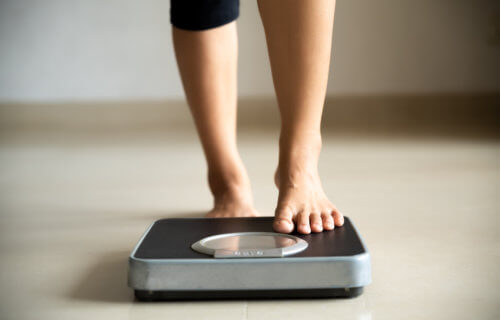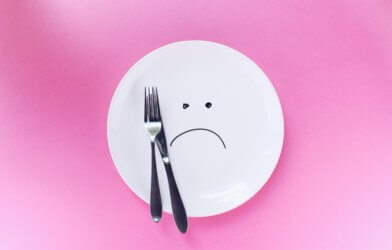Over the last several years, you’ve probably heard tons of weight loss advice, with much of it contradicting each other. One day, you should be drinking celery juice, while other days, you need to go keto or only drink smoothies for all three “meals.” More often than not, the advice is peddled by people without any actual health credentials. Aside from this, weight loss can be difficult to navigate on its own, and it’s easy to make mistakes along the way. The biggest one I see most often is that people are constantly checking the number on the scale after making even the smallest of changes.
Weighing yourself daily doesn’t give you as much insight into your overall weight loss and health journey as you might think. It’s not super reliable.
Water, fat, muscles, organs, and bones all factor into the equation. Your average scale won’t be able to tell you the differences between muscle, water, and true fat loss. Also, your weight changes every day. If you hop on the scale and notice you’re three pounds heavier than you were a day before, that doesn’t mean you truly gained three pounds overnight.
Being overly aware of these fluctuations can lead to unnecessary anxiety and worry. These anxious feelings could quickly turn into obsessive behaviors that lead to eating disorders, which can make your weight loss journey even more complicated because you’re no longer working with a healthy mindset.
Patience is one of the most difficult pills to swallow when it comes to weight loss, but it’s a must. In all reality, you can only realistically expect to lose about one to two pounds of fat each week. Expecting to hop on the scale every day to see vastly different numbers is unrealistic. If you are losing weight at a faster rate, chances are muscle loss is happening alongside it, which isn’t ideal.

How often should you weigh yourself?
If you truly want to keep track of a number, it’s much more effective to space out your weigh-ins. Try looking for weight trends every two weeks and assess what you did during that time period to improve your journey. If you are noticing that you’re on the right track, then you know to keep it up. If you don’t, then it might be time to go back to the drawing board and make some tweaks as needed.
For a more in-depth measurement, body composition might be another choice for you. A scale will tell you how much you weigh, but body composition analysis shows you where it’s coming from. It can show body fat percentage, muscle mass, bone, tissue, and water. Many healthcare professionals use this as an effective tool to enhance their care. Still, it’s not something you need to do every single day. Most people only do weigh-ins a few times per year.
Bottom Line
Weighing yourself daily places your focus on the wrong things. It isn’t a reliable indicator of overall progress and can hinder your ability to see the big picture. A lot of people who do daily weigh-ins end up developing obsessive behaviors that can turn into an eating disorder, which opens up a whole new set of problems. If you are trying to embark on a weight loss journey and don’t know where to start, don’t hesitate to find a fitness professional and/or registered dietitian who is willing to work with you and your unique needs.
You might also be interested in:
- Best Weight Loss Programs: Top 5 Diets Most Recommended By Experts
- Volume Eating: Does the dieting trend actually work for weight loss?
- Here’s why fasting could be the cure-all for Alzheimer’s and diabetes
- Snacking on nuts doesn’t lead to weight gain, debunking unhealthy myth
- Kiwis can significantly boost your mood in just 4 days




I don’t weigh. I tell by the ways my clothes fit. I’m trying to replace light-weight fat with heavy muscles so, on balance, my weight only goes down incrementally. Weight is not the problem; abdominal fat and poor circulation are a problem.
Having lost 200 pounds more than 20 years ago and even now weigh myself daily, I disagree. Weighing every day allows one to monitor their progress or lack of. However the scale can also give one details such as fat percentage and other stats if you have a modern one with an app that tracks them. Having said that, is it necessary? No. Can it help? I think so. To each their own.
True, but funny. Having weighed myself regularly, and not, it works when I am engaged in it and feel positive, but it can also be depressing and off-putting. Personally I feel like there is no definitive signal for anyone to say this helps or hurts.